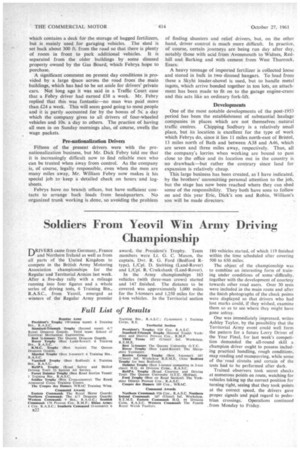Soldiers From Yeovil Win Army Driving Championship
Page 56

If you've noticed an error in this article please click here to report it so we can fix it.
DRIVERS came from Germany, France and Northern Ireland as well as from all parts of the United Kingdom to compete in the British Army Motoring Association championships for the Regular and Territorial Armies last week. After a five-day rally with a mileage running into four figures and a whole series of driving tests, 6 Training Btn., R.A.S.C., from Yeovil, emerged as winners of the Regular Army premier award, the President's Trophy. Team members were Lt. G. C. Mason, the captain, Dvr. R. G. Ford (Bedford Rtype), L/Cpl. D. Stebbing (Land-Rover) and L/Cpl. R. Cruikshank (Land-Rover).
In the Army championships 163 vehicles (with three-man crews) started and 147 finished. The distance to be covered was approximately 1,000 miles for the 3-tonners and 1,250 miles for the :1-ton vehicles. In the Territorial section
180 vehicles started, of which 119 finished within the time scheduled after covering 500 to 650. miles.
The object of the championship was to combine an interesting form of training under conditions of some difficulty. together with the development of courtesy towards other road users. Over 30 tests were included in the main route and after the finish photographs of the check points were displayed so that drivers who had lost marks could, if they wished, examine them so as to see where they might have gone astray.
One was immediately impressed, writes Ashley Taylor, by the possibility that the Territorial Army event could well form the pattern for a future Lorry Driver of the Year Final, for last week's competition demanded the all-round skill a champion driver ought to possess including practical handling, rough conditions, map reading and manceuvring, while some of the road circuits and certain of the tests had to be performed after dark.
Trained observers took secret checks at numerous points en route, watching for vehicles taking up the correct position for turning right, seeing that they took points at the correct speed, the drivers gave proper signals and paid regard to pedestrian crossings. Operations continued _ from Monday to Friday.




















































































































